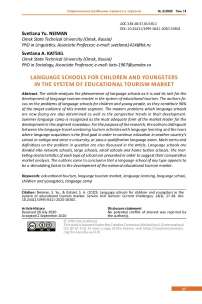Language schools for children and youngsters in the system of educational tourism market
Автор: Neiman Svetlana Yu., Katsiel Svetlana A.
Журнал: Современные проблемы сервиса и туризма @spst
Рубрика: Локальное в глобальном: формула туризма
Статья в выпуске: 3 т.14, 2020 года.
Бесплатный доступ
The article analyzes the phenomenon of language schools as it is and its role for the development of language tourism market in the system of educational tourism. The authors focus on the problems of language schools for children and young people, as they constitute 90% of the target audience of this market segment. The modern problems which language schools are now facing are also determined as well as the perspective trends in their development. Summer language camp is recognized as the most adequate form of the market leader for the development in this segment nowadays. For the purpose of the research, the authors distinguish between the language travel combining tourism activities with language learning and the tours where language acquisition is the final goal in order to continue education in another country’s school or college and enter a university, or pass a qualification language exam. Main terms and definitions on the problem in question are also discussed in the article. Language schools are divided into network schools, large schools, small schools and home tuition schools. The marketing characteristics of each type of school are presented in order to suggest their comparative market analysis. The authors come to conclusion that a language school of any type appears to be a stimulating factor to the development of the national educational tourism market.
Educational tourism, language tourism market, language learning, language school, children and youngsters, language camp
Короткий адрес: https://sciup.org/140249886
IDR: 140249886 | DOI: 10.24411/1995-0411-2020-10302
Список литературы Language schools for children and youngsters in the system of educational tourism market
- Arizmendi, A., Amaranggana, A., Cano, D., & et al. (Eds.) (2016). Student Marketing: Language Learning Tourism Insights for Destinations. The Global Report on Power of Youth Travel. Madrid: World Tourism Organization.
- Xamani, M. I. (2015). Second language acquisition and the language tourism experience. Procedia - Social and Behavioral Sciences, 178, 139-145.
- Kuznetsova, O. I., & Fodorya, A. Yu. (2013). Mezhdunarodnyj obrazovatelnyj turizm kak napravlenie sociokulturnoj deyatelnosti. [International educational tourism as a direction of socio-cultural activity]. Lichnost, semya i obshhestvo: voprosy pedagogiki i psihologii [Personality, family and society: issues of pedagogy and psychology], 32, 60-67. (In Russ.).
- Neyman, S. Yu. (2015). Rol inostrannogo yazyka v epoxu globalizacii [Foreign language share in globalization process]. In book: Perspektivy razvitiya sistemy nepreryvnogo obrazovaniya v novyh socialno-ekonomicheskih usloviyah [Perspective Development in New Social and Economic Conditions]. Omsk, 66-75. (In Russ.).
- Weiler, B., & Hall, C. M. (1993). Special Interest Tourism. Hospitality Research Journal, 16(2), 103-104.
- Gibson, H. (1998). The Educational Tourist. Journal of Physical Education, Recreation and Dance, 69(4), 32-34.
- DOI: 10.1080/07303084.1998.10605533
- Wood, C., Douglas, N., & Derrett, R. (2001). Educational tourism. In book: Special Interest Tourism: Contexts and Cases. Brisbane: John Wiley, 188-211.
- Huang, R. (2008). Mapping Educational Tourists' Experience in the UK: understanding international students. Third World Quarterly, 29(5), 1003-1020.
- DOI: 10.1080/01436590802106247
- Glover, P. (2011). International Students: Linking Education and Travel. Journal of Travel & Tourism Marketing, 28(2), 180-195.
- DOI: 10.1080/10548408.2011.546210
- Pabel, A., & Prideaux, B. (2012). Education Tourism - Linking Pleasure Travel with Tertiary Education in the Youth Market. Journal of Hospitality & Tourism Education, 24(4), 22-31.
- DOI: 10.1080/10963758.2012.10696678
- López-Serrano, S. (2010). Learning Languages in Study Abroad and at Home Contexts: A Critical Review of Comparative Studies. Porta Linguarum, 13(13), 149-163.
- Klyap, M. P., & Shandor, F. F. (2011). Sovremennye raznovidnosti turizma [Modern types of tourism]: textbook. Kiev: Znanie. (In Russ.)
- Ritchie, B. J. R., & Crouch, G. I. (2003). The Competitive Destination: a Sustainable Tourism Perspective. Wallington: Oxon (UK): CABI Publishing.
- Golikova, O. M. (2013). Issledovanie osnovnykh napravleniy detskogo turizma [Research of the main directions of children's tourism]. Services plus, 1, 62-67. (In Russ.).
- Smith, R. M. (2016). Learning How to Learn: Applied Theory for Adults. London: UK: Pearson Prentice Hall.
- Rather, A. R. (2004). Theory and Principle of Education. New Delhi: Discovery Publishing House.
- Barra, P., Marco-Lajara, B., & Cachero, C. (2019). Economic impact of language tourism on mature sun and sand destinations: The case of Alicante (Spain). Tourism Economics, 25(4), 926-941.
- DOI: 10.1177/1354816618811556
- Iglesias, M. (2014). The transformational impacts of the language tourism experience. Proceeding from The European Conference on Language Learning 2014. Brighton: The International Academic Forum, 10.
- Laborda, J. G. (2007). Language travel or language tourism: have education trips changed so much? Tourism Today, 7, 29-41.
- Zolotareva, Yu. V. (2016). Organizaciya detskogo turizma v stranah Zapadnoj Evropy [Organization of children's tourism in Western Europe]. Mezhdunarodnyj zhurnal prikladnyh i fundamentalnyh issledovanij [International journal of applied and fundamental research], 10-3, 463-467. (In Russ.).
- Vapnyarskaya, O. I. (2018). Razvitie detskogo turizma: osnovnye statisticheskie metriki [Development of children's tourism: main statistical metrics]. Servis v Rossii i za rubezhom [Service in Russia and Abroad], 12(2), 46-58. 10.24411/1995-042X-2018-10204. (In Russ).
- DOI: 10.24411/1995-042X-2018-10204.(InRuss)
- Maslakova, E. A. (2009). Upravlenie razvitiem detskogo turizma v novyh ekonomicheskih usloviyah hozyajstvovaniya [Managing the development of children's tourism in the new economic conditions of management]. Candidate Economy thesis. Moscow, State University of Management. (In Russ.).


